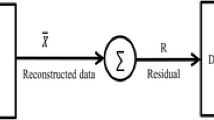Abstract
A new sensor fault diagnosis method based on structured kernel principal component analysis (KPCA) is proposed for nonlinear processes. By performing KPCA on subsets of variables, a set of structured residuals, i.e., scaled powers of KPCA, can be obtained in the same way as partial PCA. The structured residuals are utilized in composing an isolation scheme for sensor fault diagnosis, according to a properly designed incidence matrix. Sensor fault sensitivity and critical sensitivity are defined, based on which an incidence matrix optimization algorithm is proposed to improve the performance of the structured KPCA. The effectiveness of the proposed method is demonstrated on the simulated continuous stirred tank reactor (CSTR) process.
Similar content being viewed by others
References
J. Gertler, W. Li, Y. Huang, et al. Isolation enhanced principal component analysis[J]. AIChE Journal, 1999, 45(2): 323–334.
S. Qin, W. Li. Detection, identification and reconstruction of faulty sensors with maximized sensitivity[J]. AIChE Journal, 1999, 45(9): 1963–1976.
S. Qin, W. Li. Detection and identification of faulty sensors in dynamic processes[J]. AIChE Journal, 2001, 47(7): 1581–1593.
W. Li, S. Shah. Structured residual vector-based approach to sensor fault detection and isolation[J]. Journal of Process Control, 2002, 12(3): 429–443.
Y. Huang, J. Gertler, T. J. McAvoy. Sensor and actuator fault isolation by structured partial PCA with nonlinear extensions[J]. Journal of Process Control, 2000, 10(5): 459–469.
B. Schölkopf, A. Smola, K. Muller. Nonlinear component analysis as a kernel eigenvalue problem[J]. Neural Computation, 1998, 10(5):1299–1319.
S. W. Choi, C. K. Lee, J. M. Lee, et al. Fault detection and identification of nonlinear processes based on Kernel PCA[J]. Chemometrics and Intelligent Laboratory Systems, 2005, 75(1): 55–67.
D. Cremers, T. Kohlberger, C. Schnorr. Shape statistics in kernel space for variational image segmentation[J]. Pattern Recognition, 2003, 36(9): 1929–1943.
E. Parsen. Estimation of probability density function[J]. Annals of Mathematical Statistics, 1962, 33(3): 1065–1076.
W. Luyhen. Simulation examples[M]//Process Modeling, Simulation, and Control for Chemical Engineers. New York: McGraw-Hill, 1988: 124–129.
Author information
Authors and Affiliations
Corresponding author
Additional information
This work was partly supported by Scientific Reserch Fund of SiChuan Provincial Education Department (No.07ZB013) and by the Scientific Research Foundation of CUIT (No.CSRF200704).
Kechang FU was born in 1970 in Chongqing, China. He received his Ph.D. degree in 2007 from Zhejiang University, Hangzhou, China. He is currently a lecturer at the Department of Control Engineering in Chengdu University of Information Technology, Chengdu, China. His research areas include process control, process monitoring, and machine learning.
Liankui DAI was born in 1963. He received his B.S., M.S. and the Ph.D. degrees in Control Theory and Control Engineering from Zhejiang University, Hangzhou, China, in 1984, 1987, and 1993, respectively. He has been working at Zhejiang University, where he is currently a professor of the Department of Control Science and Control Engineering. His research interests include online analysis for industrial processes, statistical performance monitoring, fault detection and diagnosis of sensors and final control elements, multivariable predictive control and advanced control strategies for oil refinery.
Tiejun WU was born in 1950 in Nanjing, China. He received his Ph.D. degree in Control Theory and Control Engineering from Zhejiang University, Hangzhou, China, in 1988. He has been a professor since 1993 at the Department of Control Science and Control Engineering, Zhejiang University. His main research areas are complex systems control and optimization, computational intelligence theory and methodology, and intelligent robots control.
Ming ZHU was born in 1978. He received his Ph.D. degree in 2008 from Southwest Jiaotong University, Chengdu, He is currently a lecturer at the Department of Control Engineering in Chengdu University of Information Technology, Chengdu, China. His research interests are in the areas of signal processing, pattern recognition, and evolutionary computation.
Rights and permissions
About this article
Cite this article
Fu, K., Dai, L., Wu, T. et al. Sensor fault diagnosis of nonlinear processes based on structured kernel principal component analysis. J. Control Theory Appl. 7, 264–270 (2009). https://doi.org/10.1007/s11768-009-7164-9
Received:
Revised:
Published:
Issue Date:
DOI: https://doi.org/10.1007/s11768-009-7164-9




